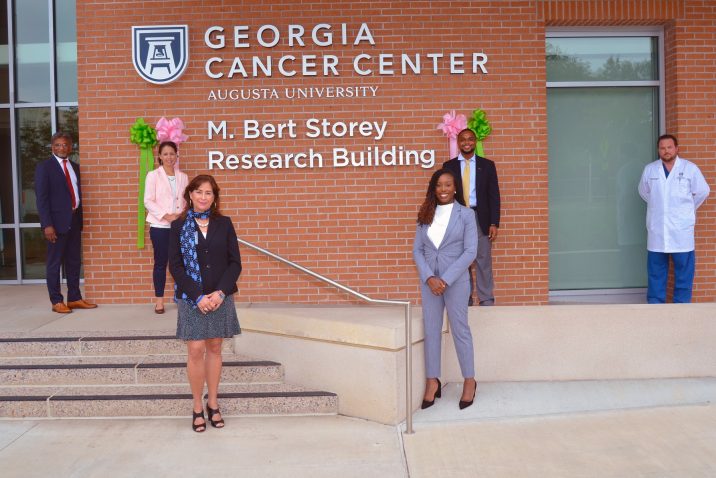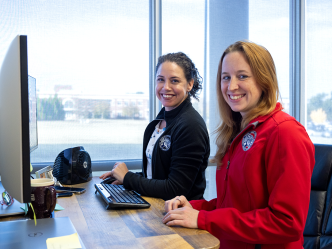When it comes to the number of cases and the number of deaths from cancer, African Americans are more likely to be diagnosed later and die earlier compared to Caucasians. With a new $3.3 million grant from the Bristol Myers Squibb Foundation awarded to a team at the Georgia Cancer Center, efforts to end these disparities, particularly for breast, multiple myeloma and prostate cancers, will aim to impact these statistics for African Americans living in urban and rural minority underserved areas in the state of Georgia.
“Right now, we are developing the curriculum for these three additional cancers for the study known as the c-CARE II (cancer-Community Awareness Access Research and Education – II) initiative,” said Dr. Martha Tingen, associate director for Cancer Prevention, Control and Population Health at the Georgia Cancer Center at Augusta University and principal investigator of the new grant.
The c-CARE II initiative is a research study designed to: 1) improve cancer outcomes in minority and underserved populations by enhancing awareness through culturally tailored education, presented by indigenous community members, who the participants know and respect; 2) facilitate access to early detection through screening; 3) navigate populations most at risk to genetic testing (when indicated); and 4) provide access to cancer care of specialized cancers of the breast, multiple myeloma, and prostate.
This three-year study will enroll 600 African American adults from 20 faith-based sites across both rural and urban counties in Georgia that are ranked with some of the poorest health indicators and outcomes in the state and across the nation.
The research study and educational program for these three cancer types are made possible by a $3.3 million grant from the Bristol Myers Squibb Foundation as part of its commitment to health equity, which focuses on raising disease awareness and education, increasing health care access and improving outcomes for medically underserved populations. In 2015, the Georgia Cancer Center received its first c-CARE grant from the Bristol Myers Squibb Foundation, which was used to develop an educational program for lung cancer awareness, navigation to screening, and cancer care when needed.
“We are so thankful to the Bristol Myers Squibb Foundation for working with our team on this new grant award,” Tingen said. Dr. Samantha Sojourner, who will serve alongside Tingen in leading the c-CARE II initiative, will work with faith-based leaders and community health care workers across Georgia to identify participants for the study.
“The idea is to let them know about risk factors for breast cancer, multiple myeloma and prostate cancer and provide seamless navigation to needed screening and treatment resources so we can reduce the number of Georgians diagnosed with those three cancers and facilitate their care when needed,” Tingen said.
“The c-CARE II program is designed to also help with modifiable risk factors and behaviors,” Sojourner said. “It is these areas where participants can make a conscious decision to live a healthier life while lowering their risk of these three potential cancers.”
“For example, we could find an African American woman in her 30s who has one or two close, family relatives who were diagnosed with breast cancer,” said Sojourner, an assistant professor and member of the Cancer Prevention, Control and Population Health program at the Cancer Center. “While she may not meet certain criteria for a mammogram, we will collaborate with our breast medical oncologist on the team, Dr. Priyanka Raval at the Georgia Cancer Center, to determine if screening is needed and if yes, will be referred for screening.”
Also included in the grant is a component called the “Twinning Project” to work with health care leaders in six countries in Africa to develop a replication of the initial c-CARE study focused on lung cancer. These countries include Eswatini, Ghana, Kenya, Lesotho, South Africa and Zimbabwe. Also, the c-CARE II initiative will provide mentoring and collaboration on breast cancer, multiple myeloma and prostate cancer and how these educational sessions are developed, tested, and then implemented. Cervical cancer will also be included in the Africa collaboration.
“We have hosted three virtual trainings on the original c-CARE I lung cancer initiative for replication across Africa,” Tingen said. “We are tailoring the lung cancer materials of c-CARE I to include the correct health statistics, wording, information, photos and illustrations, all per the Africa colleagues’ request. The six countries will have tailored materials to deliver the c-CARE I lung cancer program to their respective countries with translation into 15 languages.”
“Both Dr. Sojourner and I are passionate about improving the health of individuals so they do not end up being diagnosed with any form of cancer,” Tingen said. “Whether they live in the CSRA or across the Atlantic Ocean, we are just grateful for this opportunity make a difference in the lives of mothers, fathers, sisters, brothers and friends.”
In addition to Drs. Tingen and Sojourner, co-Investigators critical to the success of the award include Drs. Anand Jillella, Zachary Klaassen, Stephen Looney, Justin Moore, Priyanka Raval, and Marlo Vernon.
 Augusta University
Augusta University




